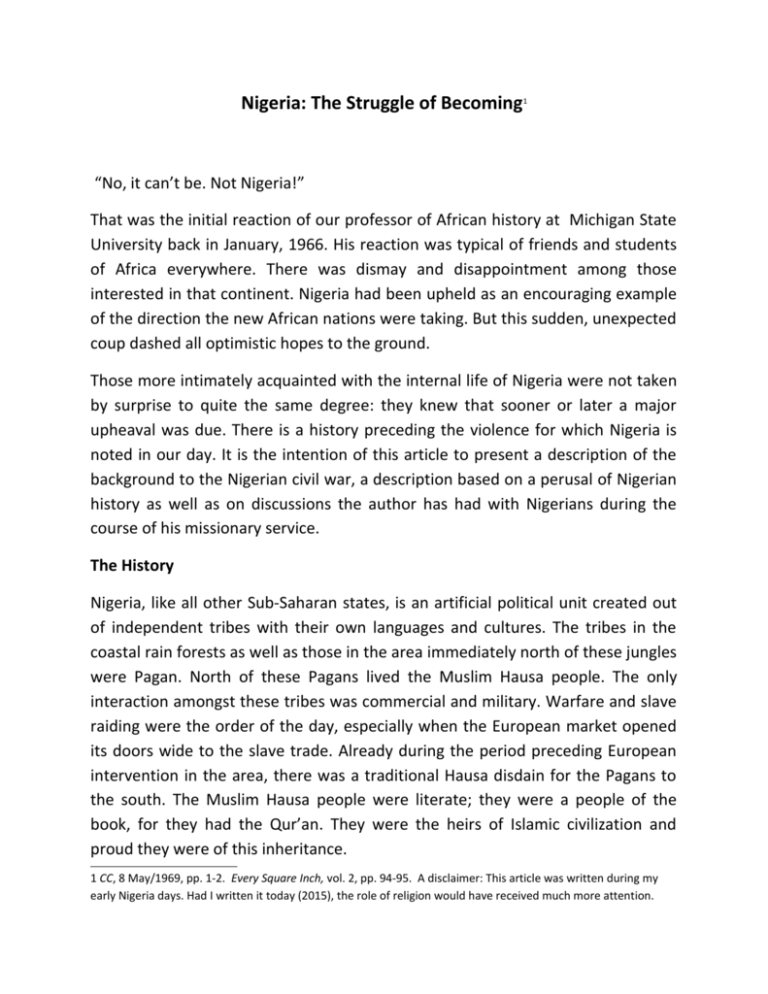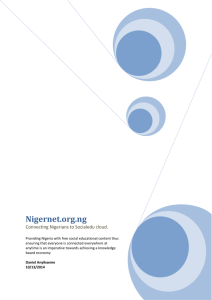Nigeria: The Struggle of Becoming.
advertisement

Nigeria: The Struggle of Becoming 1 “No, it can’t be. Not Nigeria!” That was the initial reaction of our professor of African history at Michigan State University back in January, 1966. His reaction was typical of friends and students of Africa everywhere. There was dismay and disappointment among those interested in that continent. Nigeria had been upheld as an encouraging example of the direction the new African nations were taking. But this sudden, unexpected coup dashed all optimistic hopes to the ground. Those more intimately acquainted with the internal life of Nigeria were not taken by surprise to quite the same degree: they knew that sooner or later a major upheaval was due. There is a history preceding the violence for which Nigeria is noted in our day. It is the intention of this article to present a description of the background to the Nigerian civil war, a description based on a perusal of Nigerian history as well as on discussions the author has had with Nigerians during the course of his missionary service. The History Nigeria, like all other Sub-Saharan states, is an artificial political unit created out of independent tribes with their own languages and cultures. The tribes in the coastal rain forests as well as those in the area immediately north of these jungles were Pagan. North of these Pagans lived the Muslim Hausa people. The only interaction amongst these tribes was commercial and military. Warfare and slave raiding were the order of the day, especially when the European market opened its doors wide to the slave trade. Already during the period preceding European intervention in the area, there was a traditional Hausa disdain for the Pagans to the south. The Muslim Hausa people were literate; they were a people of the book, for they had the Qur’an. They were the heirs of Islamic civilization and proud they were of this inheritance. 1 CC, 8 May/1969, pp. 1-2. Every Square Inch, vol. 2, pp. 94-95. A disclaimer: This article was written during my early Nigeria days. Had I written it today (2015), the role of religion would have received much more attention. During the course of the nineteenth century the British, for a variety of reasons, began to infiltrate the area.2 Merchants, soldiers, and missionaries pushed forward shoulder to shoulder for God and king. Gradually their hold on the area increased till the coastal tribes were organized into colonial units. They were forced into unity, though not without advantage. Along with British administration came order and peace. Commerce on a wider scale became possible, since the animosity between tribes was restrained and raiding became too risky. Missionaries brought the Gospel; they preached, they healed, they educated and they supported the colonial effort. The total effect was that these tribal peoples began to forsake their traditions in favour of a westernized-Christianized culture. They broke loose from the stranglehold Paganism enforces upon its adherents. The freedom of the Christian Gospel encouraged rapid development in the new direction. It was only a matter of time before the coastal tribes began to equal and even outstrip the Muslim Hausa in knowledge and modern skill, for the Hausa stubbornly resisted the encroachment of foreign culture. Amongst those coastal tribes were a people called Ibo. The British continued to advance into the interior till they reached the great centre of Islam, the city of Kano in the north, not without considerable African opposition. In due time, all of these previously independent tribes with a tremendous variety of culture were amalgamated into one colonial unit roughly equal to the present borders of Nigeria. The country was divided into four regions, inordinately unequal in size. The Northern region consisted of roughly three-fifths of the entire area, including the Hausa people, numbering at that time well above ten million, as well as the geographical unity known as the Middle Belt, an area inhabited by numerous Pagan tribes and in which the Christian Reformed mission is at work. During the colonial era, power within this region resided with the Muslim community. The remaining two-fifths of the country was divided into three regions. Tensions 2 For this subject go to the Section 1 of this Bibliography at Missions/Books for my 1979 dissertation Missionaries of Liberation…. as well as my 1984 summary, Missions: Heralds of Capitalism or Christ? The result of this unequal division was that the Northern Region enjoyed far greater national power than the other regions. It was frequently able to force her will on the country. But, as was explained above, the tribes to the south had in the meantime outstripped the Hausa in the skills necessary to run an amalgamated country. The civil service, therefore, was filled with southerners, especially with the industrious Ibos, who were forced to carry out the policies largely determined by the northern Hausa Muslims which had become symbols of the old order. It does not require much imagination to understand that this was a potentially explosive situation: the policies of traditional minded leaders imposed upon a progressive civil service. This brought great tensions, a situation made worse by the increasing prevalent practices of bribery and nepotism. Being among the most progressive and inventive of these coastal peoples, the Ibos quickly infiltrated the nation’s civil service. Everywhere, especially in the north, they were the leaders and managers, not only in government services, but also in private concerns. They became the craftsmen. Carpenters, mechanics, electricians and all other trades were dominated by them. The entire nation profited from their ingenuity. The other side of the coin was that the Ibo adopted a master race complex. They tended to despise other tribes and lacked the necessary restraint to hide this attitude. They were the civil servants, but often acted as civil masters. Every time a northerner came to a government office, he was confronted by uncivil Ibos. This situation did nothing to promote unity amongst tribes. Under the British administration, it appeared that the force of tribal loyalty had begun to erode in favour of a larger loyalty to Nigeria as a whole in the face of the common colonial enemy. After independence was obtained in 1960, however, it soon became apparent that this larger loyalty was little more than a veneer, and a thin one, forced upon them. The disruptive forces of small horizons and narrow loyalties soon began to take their toll in intertribal and interregional disputes. National nationalist leaders now became tribal leaders. Here, then, are four of the main factors which were responsible for the first coup of January, 1966: 1. Return to tribal loyalties at the expense of national concern. 2. Ibo civil servants and tradesmen everywhere displaying disdain for their fellow Nigerians, especially in the North. 3. A progressive civil service, largely consisting of Ibos, required to carry out policies dictated by Northern traditionalists. 4. Bribery and nepotism at every level o government and civil service. This factor has only been alluded to above, but one can readily imagine the effect of these when universally practiced. The Coups The result: in January, 1966, a group of Ibo army officers staged a coup in which they killed some very prominent leaders, including Sir Ahmadu Bello, Premier of the Northern Region and spiritual head of the Nigerian Muslim community. Ironsi, an Ibo officer, was installed as Military Governor of Nigeria. By a coincidence that was too convenient to be believed, Dr. Azikwe, the first Nigerian President, also an Ibo, happened to be in Britain for “health reasons.” He was the only national leader to have escaped death. Though the new military government forcefully stated its aim as being the establishment of a government free from bribery, nepotism and tribalism, Nigerians, especially those of the North, were convinced that the real aim was to create a state run solely by the Ibo people and for their benefit. Ironsi lasted till July, 1966, when a counter-coup was staged. It was in the wake of this coup that thousands of Ibos dispersed throughout the North were maimed and butchered. Men, women, children – none escaped the wrath of the local populations. Thousands of Ibos, through the help of expatriates, including our own missionaries, as well as that of other Nigerians, managed to escape to their homeland, but the number of those less fortunate is estimated at thirty thousand. Ojukwu soon emerged as the champion of the Ibo cause. When the new military government, headed by Yakubu Gowon a non-Hausa Christian from the North and son of an Anglican evangelist, attempted to enlist his support for a new attempt at national unity, Ojukwu was not ready to cooperate. He was guided – and still is – by the conviction that there is no room for the Ibo people in one Nigeria. The government re-organized the nation into twelve states in order to break up the huge Northern Region and so to divide the power more evenly throughout the country. Ojukwu was appointed as governor of the Ibo state. But this appointment did not appease him. Instead, after a period of angry mutual accusations and attempts at reconciliation, Ojukwu announced secession from Nigeria of the Ibo land and named his state “Biafra.” His infant “nation” comprised of a population of which approximately one-third belonged to other tribes which were not eager for Ibo domination. They, too, had chafed under Ibo superiority fever. The subsequent events are well attested in the news media. War was declared; people have died by the thousands and are continuing to do so – in military action, but also many civilians from lack of food and medical attention. We have all seen pictures of malnourished infants and children. There are Two Sides Why is it so difficult to supply these suffering Biafrans with relief supplies? Why has the Nigerian government been so reluctant to have food and medical supplies flown directly to Biafra? This, too, has its reasons. It is difficult to distinguish between cargo planes carrying relief supplies from those carrying ammunition and other military provisions. All too frequently have military missions flown to Nigeria under the pretense of carrying relief supplies. The Nigerian government has suggested that all relief supplies be cleared by her agents before forwarding to Biafra, but Ojukwu objects that the provisions will then be poisoned. And so the struggle goes on, both sides receiving help from Europeans. The bitterness is increasing – and so are the casualties. Socially the rest of the country goes about its regular business, but economically it is slowly being undermined. Money needed for schools, hospitals, roads and bridges is all absorbed by the war effort. Though we are tempted to favour the Biafran cause when confronted with scenes of its suffering people, acquaintance with this background makes it difficult to favour one side at the expense of the other. Allowing this secession would be an encouragement to other tribes to attempt a separation and create their own state. This could well cause a chain reaction that would cause Sub-Saharan Africa to revert to its former tribal culture, with thousands of tiny, powerless and resourceless nations. The Nigerian Government is battling a disease that is African –no Communist agitation lies at the bottom of this, as people on this continent tend to suspect. It is a disease that must be overcome if Nigeria, or Africa as a whole, is to succeed in this modern world. Ojukwu’s claim that Nigeria is committing genocide is, so far at least, unfounded. Ibos living in areas reclaimed by the Federal forces are given food and aid in resettling. They are not, in fact, being murdered. Presently, the work of our mission goes unhampered. But there are indications that difficult times may be ahead. The Christian Reformed mission operates two secondary schools, one teachers’ training college and two hospitals, all of which have enjoyed heavy financial subsidy from the government. Recently the mission has been informed that in 1969 only about one quarter of the normal allotment will be available. As for 1970, no promises have been made at all. Will this mean curtailment? This remains to be seen. It may well mean that the Christian Reformed constituency will be called upon to increase her financial support of these institutions by thousands of dollars. It is in this Nigeria, torn by war and tribal loyalties, that a Christian community has been created. If this community has one task, it certainly is to demonstrate that there can be unity around the banner of Christ. Unity is the issue in Nigeria. It is unity, therefore, that must be considered when important decisions are made by the church with respect to her task in Nigeria. This is one reason missionaries have actively supported the Theological College of Northern Nigeria, an experiment in unity in a nation decimating because of small horizons. Pray for Nigeria. Pray for Biafra. Pray that Christ may heal her broken wounds through the ministry extended to her by the Christian community in love and in the spirit of reconciliation.









